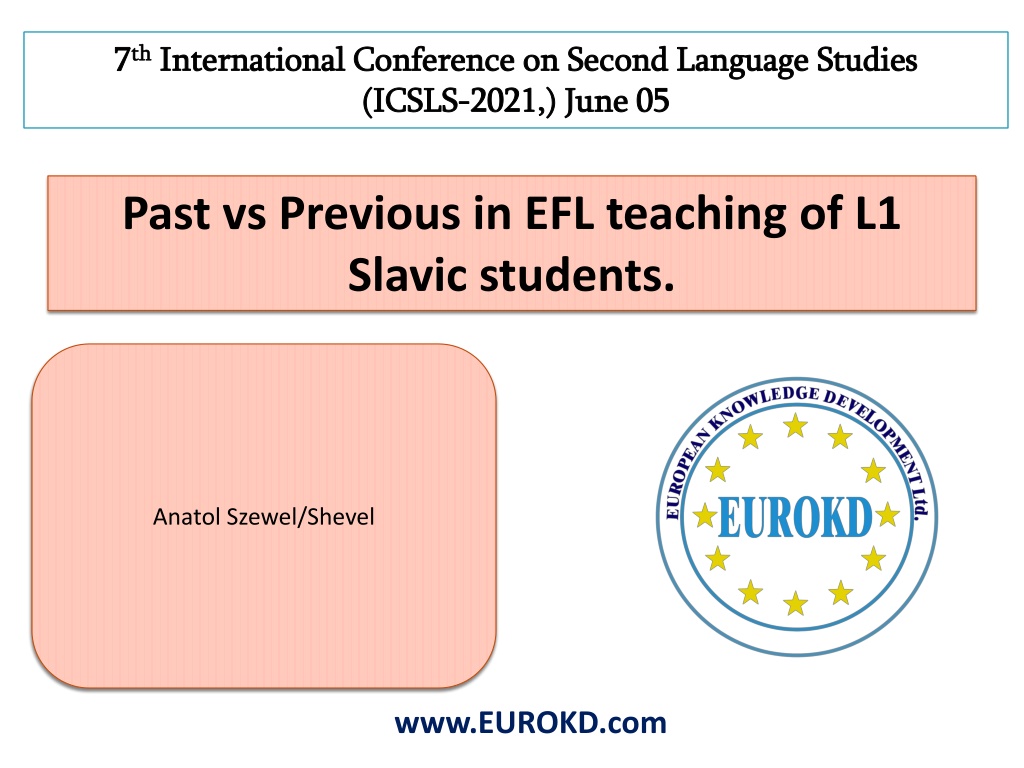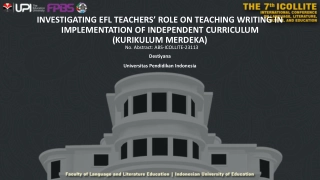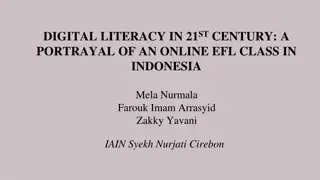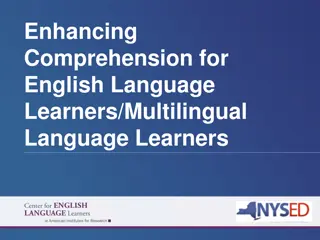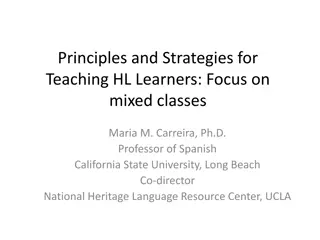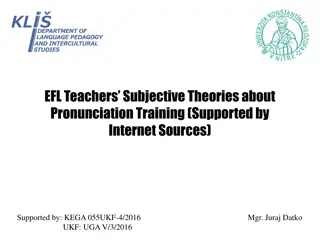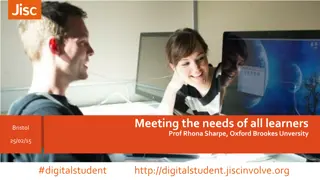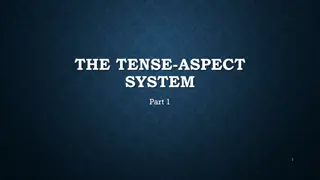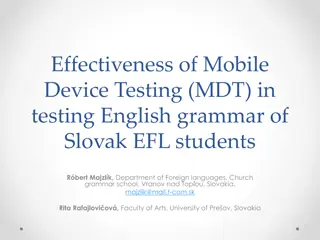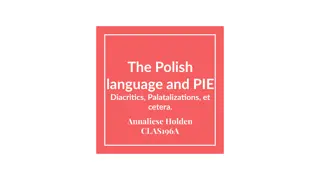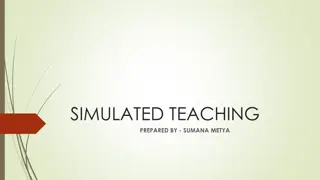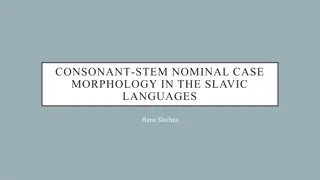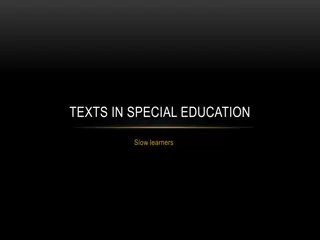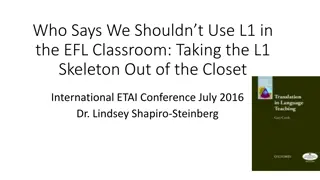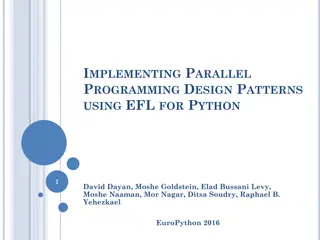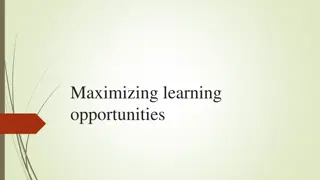Challenges in EFL Teaching for Slavic L1 Learners
Slavic L1 learners of English face challenges due to the transfer of their native language's grammatical system. This study explores how the wording of grammatical explanations in English impacts students' conceptualization of grammar. It emphasizes the importance of proper instruction and highlights the differences between Slavic and Germanic languages in language acquisition.
Download Presentation

Please find below an Image/Link to download the presentation.
The content on the website is provided AS IS for your information and personal use only. It may not be sold, licensed, or shared on other websites without obtaining consent from the author. Download presentation by click this link. If you encounter any issues during the download, it is possible that the publisher has removed the file from their server.
E N D
Presentation Transcript
7 7th thInternational Conference on Second Language Studies International Conference on Second Language Studies (ICSLS (ICSLS- -2021 2021,) June ,) June 05 05 Past vs Previous in EFL teaching of L1 Slavic students. Anatol Szewel/Shevel www.EUROKD.com
Authors Photo ICSLS-2021 2
Authors short biography Academic teacher since 1992. The subjects taught at BA and MA levels: Didactics of EFL, Intercultural communication, Technical translation, Business English, Academic writing, Theoretical and practical grammar. Father of 4 bilingual children. ICSLS-2021 3
Introduction It has been noticed that Slavic L1 learners of English make mistakes in using verb forms due to the transfer of their L1 grammatical system (grammar concepts) onto the English language. The goal of the study was to show how the wording of grammatical explanations in English influences the conceptualization of grammatical items by the students. ICSLS-2021 4
Literature Review Halliday (1978), Langacker (2008), Leech & Svartvik(1983), etc. point to the fact that grammatical items convey concepts/ideas/ meanings which can be explained to language learners or grasped by them intuitively and derive from embodied human experience where mental processes in semantics and grammar play a critical role . ICSLS-2021 5
Literature Review Selinker (1972), Han (2004), etc. indicate that the interference of two languages is not always beneficial, especially in adult learners where brain lateralization is coupled with fossilization and they explain this phenomenon as being due to external and internal factors. One of the factors the authors mention is the lack of proper instruction. ICSLS-2021 6
Literature Review Janda(2007), Kaushanskaya (2008), Boldyrev (2016), etc. discuss the conceptual differences between Slavic and Germanic languages. Janda (2014): Russian is a language where things happen to people, whereas Czech, like English, is a language where many of the same experiences are instead things that people do . ICSLS-2021 7
The Study A group of 127 University students at BA and MA levels were offered a transformation exercise Present > Past time covering the following grammatical items: Perfect and Non-perfect tenses; S+Passive Verb+to-Infinitive; Causative have; All varieties of it s time construction; Wish+Past or Past Perfect tense; Modal verbs+ Perfect or Non- perfect infinitive. ICSLS-2021 8
Research Question(s) How does the wording and structure of the explanation correlate with the correctness of handling the grammatical items, hence, corrupting the message or otherwise? ICSLS-2021 9
Methodology The students were offered a transformation exercise including all the mentioned grammatical items and asked to justify their answer. The explanations of the right and the wrong answers were grouped and calculated. ICSLS-2021 10
Results The answers Construction Right answer Wrong answer Right/wrong % Tenses 110 17 87/13 S+Passive Verb+to- Infinitive Causative have 32 95 25/75 106 21 83/17 It s time 45 82 35/65 Wish 32 95 25/75 Modals 54 73 42/58 Total 379 383 49/51 ICSLS-2021 11
Discussion In view of the fact that the pass level at the University scale is 60%, I would like to discuss the wrong answers above this value, that is the ones that failed the test. Those are: S+PV+to-inf; Wish ; It s time constructions. The common feature in the students justifications of the wrong answers was a direct shift between the present and past verb form in the case of tense use and association of the perfect infinitive with past time. ICSLS-2021 12
Discussion Subject + Passive verb + to-Infinitive The sentence:Theysayhe livesthere was correctly changed to: He issaidto live there. But Theysaidhe lived therewas wrongly changed to: *He was saidto havelived there.* In their explanations the students did not use the following concept: the form of the infinitive depends on its correlation with the Passive verb which can be parallel or previous in time. ICSLS-2021 13
Discussion The wish constructions I regret he isnot herewas correctly transformed to I wishhe was here. But I regretted he was not there was wrongly changed to *I wishedhe hadbeenthere.* The justification was similar in all the cases and followed the popular pattern: Wish + Past tense - for the present time Wish + Past perfect tense - for the past time ICSLS-2021 14
Discussion It s time construction 1)Theysayit stimeto do it was wrongly shifted to the past time: Theysaiditwas time*to havedone* it, for the reason that the Perfect infinitive was associated with the past time. 2)Theysayit stimeyoudiditwas wrongly rewritten to the past time: Theysaiditwas timeyou*haddone* it, as the students were guided by the same explanation as in the wish-constructions. ICSLS-2021 15
Implications What is so confusing about this PAST? The answer is to be found in the fact that in Slavic languages the grammatical Past is monolithic one past time area (located in the time space previous to NOW), while in English we discriminate different grammatical past time areas many grammatical pasts in the past: 1) open past; 2) closed past;3) before past - which are represented in Slavic languages by the same form; e.g. Polish zrobi em to can be the Present Perfect, Past Simple or Past Perfect. ICSLS-2021 16
Implications Not to confuse the Slavic language learners, the wording of explanations should be changed for the following: Non-perfect forms (tenses and infinitives) imply parallelism with the point of reference, while perfect forms previousness. The word past should not be correlated with the situations in which a Perfect form is to be used. ICSLS-2021 17
Suggestions for Further Research My study covers the comparison of English to Polish, Russian and Ukrainian languages. It would be interesting to know if and how it works with other Slavic languages. More discussion and examples can be found in the post-conference publication if/when it is published under the same title in Language Teaching Research Quarterly. ICSLS-2021 18
Bright Future is Yours www.EUROKD.com ICSLS-2021 19
